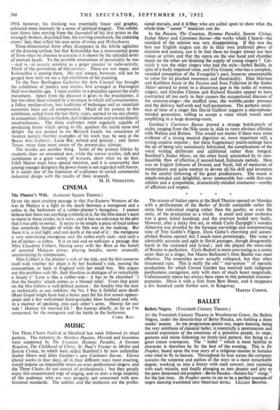MUSIC
THE Three Choirs Festival at Hereford last week followed its ritual pattern. The statutory St. Matthew Passion, Messiah and Gerontius were supported by The Creation, Hymnus Paradisi, A German Requiem, The Childhood of Christ, St. Paul's Voyage to Melita and Sancta Civitas, to which were added Stanford's by now unfamiliar Stabat Mater and John Gardner's new Cantiones Sacrae. Eleven choral works in four days, all in their different ways most exacting, would impose an impossible strain on even professional singers, and the Three Choirs do not consist of professionals ; but they greatly enjoy this concentrated orgy of singing, and so does a large majority of the audience, who are very properly not concerned with pro- fessional standards. The soloists and The orchestra are the profes- sional recruits, and it inhey who are called upon to show what the whole-time " career " musician can do.
In the Passion, The Creation, Hyttmus Paradisi, Sancta Civitas, Stabat Mater and Cantiones Sacrae—the works which I heard—the standard of the soloists was very disappointing. If ffiis was the best our English singers can do in their own preferred genre of oratorio and cantata, can it be that these no longer attract our best voices or artists and that the opera on the one hand and chamber music on the other are draining the supply of young singers ? Cer- tainly it was the older singers who had the style—Isobel Baillie, in spite of a badly impaired voice, and Eric Greene, who has a complete, rounded conception of the Evangelist's part, ho,vever unacceptable to some for its pinched sweetness and theatricality. Elsie Morison and Kathleen Joyce in the Passion and Joan Fullerton in the Stabat Mater seemed to point to a disastrous gap in the ranks of woman singers, and Gordon Clinton and Richard Standen appear to have contracted all too early in their careers the occupational diseases of the oratorio-singer—the muffled tone, the wobbleunder pressure and the delivery half-arch and half-portentous. The pathetic small- ness of tone of a singer like David Galliver suggests a microphone- minded generation, willing to accept a voice which would need amplifying in a large drawing-room.
Gardner's Cantiones Sacrae proved a strange hotch-potch of styles, ranging from the Nile scene in Aida to more obvious affinities with Walton and Britten. This would not matter if there were more evidence of a strong musical digestion or, more important still, a strong creative impulse ; but these fragmentary psalm-settings have the air of being very consciously fabricated, the complications of the vocal writing deliberate and additional rather than integral. Stanford's Stabat Mater, on the other hand, astonished by its inex- haustible flow of effective, if second-hand, Italianate melody. Here was an English follower of Dvorak and Verdi, full of memories of masterpieces and quite content to devote all his skill and invention to the careful following of his great predecessors. The music is simple-minded and delightful, never memorable but—with first-rate soloists and a sympathetic, dramatically-minded conductor—worthy of affection and respect.
* * *
The season of Italian opera at the Stoll Theatre opened on Monday with a performance of the Barber of Seville noticeable rather for some fine individual singing rather than the quality, or even the unity, of the production as a whole. A small and poor 'orchestra was a great initial handicap, and the overture boded very badly. However, after a sticky first act, in which Carlo Zkmpighi's wooden Almaviva was dwarfed by the baroque curvetings and overpowering tone of Tito Gobbi's Figaro, Dora Gatta's charming and accom- plished Rosina opened Act 2 much more promisingly. Her voice is admirably accurate and agile in florid passages, though disagreeably harsh in the sustained and lyrical ; and she played the minx-side of Rosina to perfection. Carlo Badioli is more convincing as a comic actor than as a singer, but Marco Stefanoni's Don Basilio was most effective. The ensembles never actually collapsed, but they often threatened ruin. This is really the old " star-system " of operatic production, for which Covent Garden has received such indignant posthumous castigation, only with stars of much lesser magnitude. Unfortunately opera has always been open to this potential misinter- pretation. Drive it with a fork from Bow Street, and it reappears a few hundred yards further east, in Kingsway.
MARTIN COOPER.


































 Previous page
Previous page